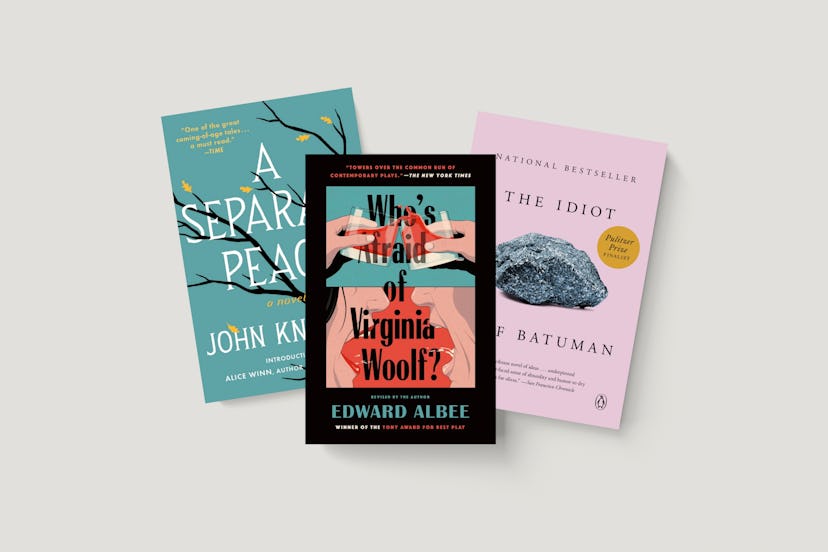Books
5 Books & Plays That Take You Deep Inside The Ivory Tower
Screenwriter Nora Garrett turned to these literary works to help shape her Yale-set psychological thriller, After the Hunt.

While screenwriter Nora Garrett’s debut film, After the Hunt, unfolds on Yale’s campus — and is deeply steeped in the school’s milieu — its inspiration came from somewhere far less glamorous: a continuing education Zoom class. “During the pandemic, I took a couple of ad hoc philosophy courses from the Brooklyn Institute of Social Research on Hannah Arendt, Kierkegaard, Nietszche, and [the] Stoics,” Garrett tells Bustle. At the time, Garrett wasn’t trying to mine material for a screenplay. She was simply interested in “how to live morally in what often feels like an immoral world.”
But when she first began to conceive of After the Hunt — a Me Too-inspired, philosophy department-set psychological thriller directed by Luca Guadagnino and starring Julia Roberts and Ayo Edebiri — Garrett realized she’d found a fictional container for all that Stoicism she’d been absorbing. In the film’s discussions of Foucault’s panopticon or debates about Freud’s misogyny, Garrett reveals the character’s most base desires through these otherwise opaque debates.
For her next project — an adaptation of a long-form article she can’t talk about just yet — Garrett is coming at the material from the opposite angle. This time, all the research is brand new to her, and and there’s no past arsenal of ad hoc courses to pull from. “It's difficult to say which [process] is particularly more generative,” she says. “I think it's like songwriting. Some songs come out immediately, and some songs take months and months or years and years to get right.”
Below, Garrett recommends her non-Nietzschean inspirations: five college-set works that informed After the Hunt.
The Secret History by Donna Tartt
“It's that rare, perfect novel where it's both incredibly well-written and so propulsive that you just can't stop reading it. When I read it, I felt so steeped in both the insularity and the exclusivity of the higher education environment. But since you're experiencing it from the [perspective of this] relative outsider, you're able to understand both the desire to be a part of it and the abhorrence of it. Which I think is kind of [After the Hunt character] Maggie's struggle, in some ways.”
A Separate Peace by John Knowles
“It's set in the backdrop of World War II and it's loosely based on Phillips Exeter Academy. So again, this East Coast WASP-y, insular, elitist space. But it's about how jealousy, fear, and insecurity can lead us to [commit] these impulsive actions. I'm really attracted to books, plays, and films in which you see people making horrible mistakes and how they come back from that. How they reintegrate themselves. But it's also just a touching portrait of two boys attempting to have a relationship and understanding how to maneuver their own masculinity [against] the emotionality of their friendship. It’s very Dead Poets Society-adjacent.”
Who’s Afraid of Virginia Woolf? by Edward Albee
“Who's Afraid of Virginia Woolf? might be my favorite play of all-time. When I was in acting school I played Martha, even though I was much too young for that role. It's one of those portraits where if you take it at face value, the way that these characters are talking to each other can seem really mean, pointed, and barbed. But at the end of the play, you realize how much love, pain, and hurt is undergirding this relationship.”
The Idiot by Elif Batuman
“What this novel really captures is that awkward, early phase of college where you've gotten into an elite institution that you thought would give you the sense of identity you wanted — and you're still finding yourself awkward, bumbling, and estranged from the ability to feel yourself at the apex of your intelligence, even in these rarefied spaces. I think that the shame of that and the attempt to work through it is a reference for Maggie, but just generally a reference for that tender identity point.”
Proof by David Auburn
“This isn’t taking place within the walls of academia, but the off-stage character is a mathematician who has passed away. I think most people who gravitate towards mathematics do it because there's a surefire answer. There's a very clear, ‘This is the right answer, this is the wrong answer.’ And what Proof did so elegantly was explore authorship and ownership within the context of what is usually very black and white.”